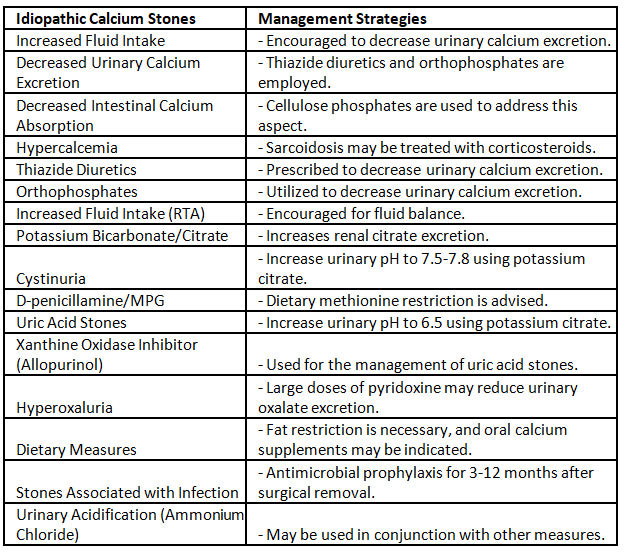Renal Stones | Medical Science Optional Notes for UPSC PDF Download
| Table of contents |

|
| Approach to Hematuria |

|
| Renal stones-Etiology |

|
| Renal stones-lmaging |

|
| Medical treatment of Renal stones |

|
| Renal stones-Management |

|
| Renal stones-Repeats |

|
Approach to Hematuria
Hematuria occurs when there is blood in the urine. Causes of hematuria include Trauma, Infection and Neoplasm (think of TIN) at all levels of the urinary tract.
Causes of hematuria include Trauma, Infection and Neoplasm (think of TIN) at all levels of the urinary tract.
Verify the presence of red discoloration - Numerous drugs and food items have been documented to cause unusual coloring of urine. While various hues have been reported, the most commonly observed clinically are red/orange and brown.
Ask about the timing of blood occurrence concerning the urinary stream:
- In the beginning (suggestive of urethral pathology)
- Throughout the stream (indicative of upper tract or bladder pathology)
- At the end (associated with bladder neck or prostatic issues)
Glomerular diseases
- Acute post-infectious glomerulonephritis is the most common among glomerular diseases.
- IgA nephropathy is another prevalent glomerular disorder.
- Benign familial hematuria is characterized by a family history of blood in the urine without associated renal impairment.
- Systemic infections such as malaria, leptospirosis, and infective endocarditis can lead to glomerular diseases.
- Membranoproliferative glomerulonephritis is a specific form of glomerular inflammation.
- Focal segmental glomerulosclerosis involves scarring in specific segments of the glomerulus.
- Systemic lupus erythematosus, an autoimmune condition, can affect the glomeruli.
- Hemolytic uremic syndrome is characterized by the triad of hemolytic anemia, thrombocytopenia, and acute kidney injury.
- Henoch-Schonlein purpura is associated with purpuric skin lesions and joint pain.
- Alport's syndrome is a hereditary disorder affecting the glomerular basement membrane.
- Goodpasture's disease is an autoimmune condition primarily affecting the kidneys and lungs.
Causes of Recurrent hematuria
- IgA nephropathy is a kidney condition involving the deposition of IgA antibodies in the glomeruli.
- Alport's syndrome is a hereditary disorder affecting the glomerular basement membrane.
- Benign familial hematuria is characterized by a family history of blood in the urine without associated renal impairment.
- Nephrolithiasis, the formation of kidney stones, can be caused by factors such as hypercalciuria, tumors, and tuberculosis.

Investigations
- Urinary dipstick test
- CUE examination-RBC
- Renal ultrasound scan (USS)
- Flexible cystoscopy
Risk factors for malignancy
- Age exceeding 35 years is a risk factor for malignancy.
- Analgesic abuse is associated with an increased risk of malignancy.
- Exposure to chemicals or dyes, such as benzenes or aromatic amines, is a risk factor.
- Male gender is identified as a risk factor for malignancy.
- Past or current smoking is another risk factor contributing to the likelihood of developing malignancy.
Renal stones-Etiology

Renal stones-Clinical features
- Ureteric Colic (Renal Colic): Localized, colicky pain that radiates to the groin or lower abdomen and may extend to the testicle/labium but not to the back of the leg.
- Differentiation from Renal Pain: Renal pain, usually caused by distension of the renal capsule, presents as a constant, gnawing pain in the loin/renal angle (as seen in acute pyelonephritis).
- Hematuria:
- Recurrent or microscopic hematuria (rarely gross).
- Differential diagnosis includes renal stones, with consideration for other causes of hematuria.
- Possible Causes of Hematuria:
- Acute pyelonephritis (associated with high-grade fever, chills, and loin pain).
- Abdominal aortic aneurysm (common in elderly males).
- Renal trauma (history of trauma).
- Renal infarction.
- Renal malignancy.
- Retroperitoneal infection.
- Pneumonia.
- Acute cholecystitis.
- Ovarian pathology.
- Testicular torsion.
- Appendicitis.
Renal stones-lmaging

Renal stones-Management
- Expectant Management for Stones <5 mm:
- Most stones smaller than 5 mm are expected to pass spontaneously.
- Medical expulsion therapy, involving alpha-blockers and calcium channel blockers like nifedipine, is a subject of controversy.
- Expectant Management Procedures:
- NSAIDs (Diclofenac) for pain relief.
- Monitoring vital signs.
- White blood cell (WBC) monitoring for signs of infection.
- Estimation of estimated glomerular filtration rate (eGFR) to identify any decline in renal function.
- Medical Treatment of Urinary Stones:
- Aim for a urine output of 2.5 L in 24 hours.
- Correction of dietary excesses.
- Specific drugs may be prescribed for certain stone-related conditions.
Medical treatment of Renal stones

Renal stones-Management
Indications for surgical intervention are stones > 5mm, Stones with persistent pain, obstruction and infection
Open surgery and Nephrectomy are rarely practiced now a days
Renal stones-Repeats
Q1: Enumerate the various methods for the treatment of renal stones. (1996)
Q2: Enumerate various methods of treatment of kidney stones. (1998)
Q3: A-young female is having Multiple Bilateral Renal Stones with body aches and recurrent urinary infection. How will you manage it? (2005)
Q4: How would you manage an old lady with stag-horn calculus in left kidney? (2011)
Q5: Discuss the etiology, types, clinical features, investigation and treatment modalities of renal stone. (2016)
Q6: A 40-year-old male patient is presented with hematuria off and on for the last 4 months. Enumerate the causes of hematuria. How will you investigate the patient to reach the diagnosis? Discuss the treatment of renal stones. (2018)
|
7 videos|219 docs
|
FAQs on Renal Stones - Medical Science Optional Notes for UPSC
| 1. What is the approach to hematuria? |  |
| 2. What are the etiologies of renal stones? |  |
| 3. What imaging modalities are used for the evaluation of renal stones? |  |
| 4. What are the medical treatment options for renal stones? |  |
| 5. What is the management approach for renal stones? |  |

|
Explore Courses for UPSC exam
|

|
















